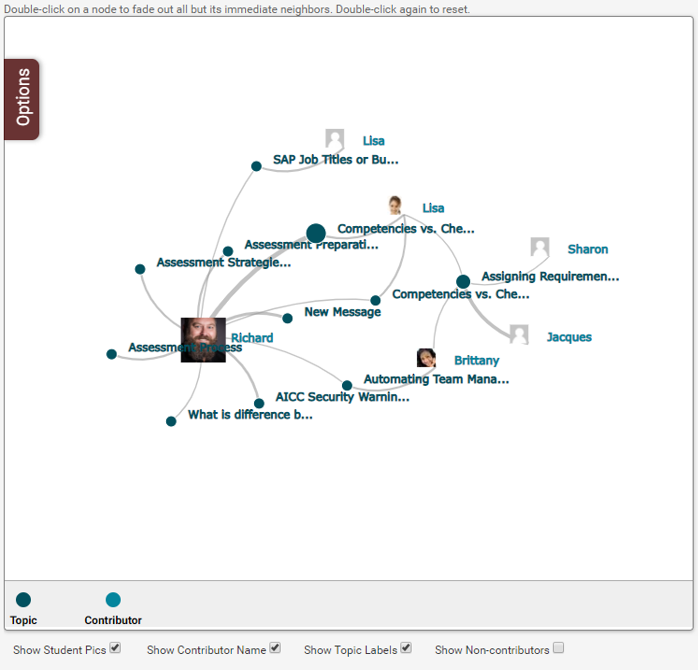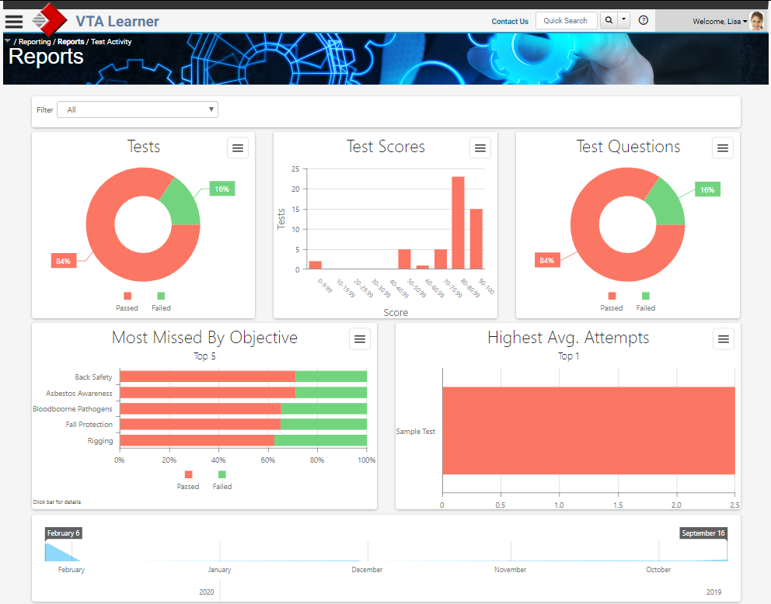VTA Learning Ecosystem Platform
RISC has been committed to xAPI support since 2012, when we adopted xAPI in the 0.9 version. In 2013, RISC was the first LMS with a built-in LRS. This was the start of the VTA Learning Ecosystem Platform. Since then we have continuously worked on improving our support for xAPI. In 2016, RISC became the first LMS/LRS to support cmi5, an xAPI profile that defines the use of xAPI in the “LMS launches content” scenario.
LMS as Activity Provider
As part of our support of xAPI, we believe it is not sufficient to have an LRS solely to launch and track xAPI and cmi5 content. Instead, we believe it is critical that the LMS is a key player in the ecosystem. This means that the LMS must act as an “activity provider” to the LRS, sending statements so that the LRS becomes the “single source of truth”. In support of this goal, here is the xAPI activity generated by our LMS.
- Forums
One of the early goals of xAPI was to track social learning. In the VTA ecosystem, forums are a key social learning component. Each forum contribution writes an xAPI statement. We also track when contributions are “voted up” and “voted down” by other forum members or marked as the correct answer by a moderator. VTA has supervisor level reporting on forum activity so that supervisors can easily identify key contributors.

- Blogs
As another part of tracking social learning, we send xAPI statements when students read blogs in VTA. We also record blog ratings in the LRS. - Launches
When a student opens a content module, document or resource we send a “launched” statement to the LRS. - Videos
The VTA system uses the xAPI Video Profile to track consumption of video resources. - Tests
Each test question delivered through VTA is tracked in the LRS. This allows for the type of test analytics shown below.

- SCORM Data
The VTA system automatically converts your SCORM data into xAPI statements. This enables data from all your content, whether it is SCORM, xAPI or cmi5, to end up in one place: the LRS. This includes any test questions that may be in your SCORM content. - Spaced Learning
With our new Spaced Learning capability text messages are sent to students with a link to micro-learning. The student never logs onto the LMS, yet we can track the results using xAPI. In this case, it would likely take the student longer to logon to the LMS to find and launch the lesson, than it does to complete the micro-learning. - Registrations
When a student enrolls in a course, we send a “Registered” statement, whether it is an online course or instructor-led. For courses that require supervisor approval, we also send a statement when the supervisor approves or rejects the enrollment. - Completions
When a course contains multiple lessons, completion of each lesson will generate a “satisfied” statement for the lesson. When the entire course is completed, we also send a “satisfied” statement referencing the course. - Flashcards
When a student views Flashcards in VTA, we track it in the LRS. In fact, RISC developed the xAPI Flashcard Profile. - Competency Assessments
VTA tracks competency assessment in the LRS. Both self-assessment and supervisor/assessor ratings are tracked. - Performance Checklists
When a supervisor completes a checklist in the VTA system, statements are created in the LRS. - Waived Lessons
In the VTA ecosystem, it is possible to “test out” of lessons. For each lesson that can be skipped, we send a “waived” statement.
LRS as Single Source of Data
Most experts in the L&D world agree that the majority of learning occurs outside the LMS. With xAPI, we now have a way to track that learning. The obvious implication is that the LRS must be able to track statements for activities that are NOT launched by the LMS. This is one of the key drivers behind the development of xAPI. The VTA Learning Ecosystem Platform fully supports writing to and reading from the LRS without going through the LMS.
Our Spaced Learning feature is one example where training is available without logging into the LMS. There are many other learning applications where the LMS is not required, such as mobile apps, simulations, gaming and social learning.
Data Portability
With xAPI we are now tracking much more data than ever. So, there is a real need for a variety of analysis tools. While LRSs generally have their own analytics, you may want to compare training data with other data sources. For example, how about comparing training activities with sales data? To support analysis and data portability, xAPI specifically requires that data can be extracted from one LRS into another. The VTA Ecosystem fully supports this capability.
Another requirement for data portability is that statements conform to the xAPI specification. Accepting invalid statements breaks data portability. Fortunately, ADL has developed a conformance test for LRSs. The VTA Learning Ecosystem Platform has passed this conformance test.
xAPI Support in Reporting
We believe that full integration of the LRS and the LMS means better reporting. Why? We can combine LMS data to LRS data in a single report. For example, in the test analytics page shown previously in this article, we are able to filter reports to show only students that report to a particular supervisor. This means we need LMS information (which students report to which supervisor) as well as LRS information (test question results). That would be hard to do with a standalone LRS.
Summary
RISC is strongly committed to xAPI and will continue to be the leader in xAPI support. In the VTA Learning Ecosystem, the LMS is a strong contributor to the data tracked in the LRS, and we allow access to the LRS without going through the LMS. Finally, we support data portability by maintaining conformance to the xAPI specification.[/vc_column_text][/vc_column][/vc_row]

